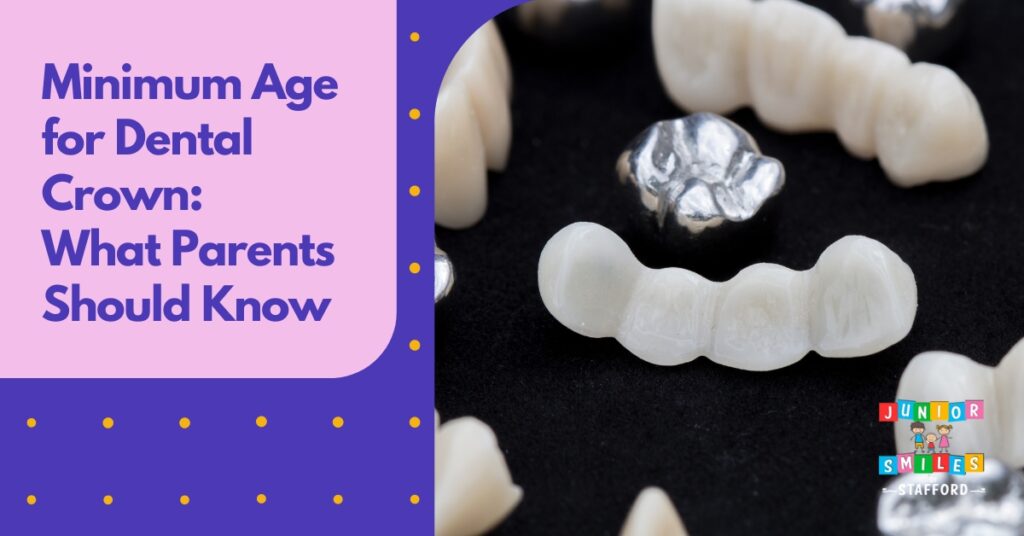Minimum Age for Dental Crown: What Parents Should Know

Dental crowns are not just a solution reserved for adults. They play a vital role in restoring and preserving patients’ oral health across various age groups, including children. But when is it appropriate to consider it, and what is the minimum age for this procedure? Misconceptions and uncertainty often cloud the subject.
Whether you’re a concerned parent, a young adult exploring dental restoration options, or simply curious about dental health, understanding the right time for crown treatments is crucial. This blog post will shed light on the minimum age requirements for pediatric crowns, explore the unique considerations for younger patients, and guide you through decision-making. Read on.
What are dental crowns?
These are often referred to as “caps.” They are custom-made restorations to cover or encase a tooth’s surface. Their primary purpose is to restore a damaged or decayed tooth’s size, shape, strength, and appearance.
Made from various materials like porcelain, ceramic, resin, or metal, crowns act as a protective shield, safeguarding the vulnerable tooth underneath. Dental crowns play an indispensable role in dental health, whether due to extensive cavities, cracks, wear, or following root canal treatment. By mimicking the natural tooth’s function and aesthetics, they offer both rehabilitative benefits and cosmetic enhancements, allowing individuals to chew comfortably and smile confidently.
How common are pediatric crowns?
Pediatric crowns have become increasingly common in modern dentistry to protect and restore primary (baby) teeth that are damaged or decayed. While primary teeth are temporary and eventually give way to permanent teeth, their health is crucial for proper chewing, speech development, and holding space for the forthcoming adult teeth.
When Can Children Get Dental Crowns?
Children can receive dental crowns at a surprisingly young age, depending on the specific circumstances of their dental health. It’s not only about the age but the need. For instance, if a toddler experiences severe tooth decay that a regular filling can’t address, a pediatric dentist might recommend a crown to salvage the tooth and prevent further damage. Therefore, even if a child as young as two or three has significant dental issues, crowns might be recommended.
Are Crowns on Baby Teeth Necessary?
Given their temporary nature, the idea of placing crowns on baby teeth may seem unnecessary. However, the health and maintenance of primary teeth are integral to a child’s overall oral development. While they are destined to fall out, baby teeth serve vital functions: they aid in proper chewing, influence correct speech patterns, and, most crucially, reserve space for the impending adult teeth, guiding them into their right positions.
Suppose a baby’s tooth is lost prematurely due to severe decay or damage. In that case, it can lead to space loss for the permanent tooth, potentially causing misalignment issues and crowding. In cases where the damage to a primary tooth is too extensive for a regular filling, a crown becomes necessary to preserve the tooth’s function and prevent further oral health complications.
Factors Influencing Minimum Age for Dental Crowns
The decision to place a dental crown, especially in pediatric patients, is influenced by various factors rather than a strict age guideline. Here are the main factors that influence the minimum age for dental crowns:
Extent of Damage
The degree of tooth decay or structural damage is a significant determinant. Minor cavities might be treated with fillings, but more extensive damage or deterioration often necessitates crowns, irrespective of age.
Oral Habits
Children with detrimental oral habits, like prolonged thumb sucking or use of a pacifier, may require early intervention, sometimes in the form of temporary crowns, to correct or prevent dental issues.
Overall Oral Health
The general health of the child’s mouth—including gum health, infections, and other dental issues—can influence the decision to place a crown.
Consultation with Pediatric Dentist
Ultimately, a check-up appointment with a dentist is needed before a dental crown fitting. This dentist for kids can assess your child’s individual needs and the specific circumstances surrounding the affected tooth, which is crucial in deciding the appropriateness and timing of a dental crown.
Are Crowns on Baby Teeth Necessary?
Yes. Suppose a primary tooth is prematurely lost due to extensive decay or damage. In that case, it might lead to misalignment issues, as it no longer guides the permanent teeth into their rightful positions. Moreover, early loss can cause neighboring teeth to drift into the vacant space, resulting in crowding or spacing issues. Therefore, crowns emerge as a necessary intervention when a baby tooth has suffered significant damage or decay that a regular filling cannot rectify. This protective measure ensures the tooth’s function is preserved, avoiding potential alignment complications in the future.
How long do teeth crowns last?
Generally, dental crowns have a lifespan of about 5 to 15 years, but this range can vary significantly based on several factors. The material of the crown (whether porcelain, ceramic, resin, metal, or a combination), the wear and tear it is subjected to, oral habits like grinding or clenching, and the adherence to good oral hygiene practices can all influence its durability. For instance, due to their robustness, metal crowns might outlast their porcelain counterparts.
Read More: How to Deal With and Replace Missing Front Teeth
Give Your Child the Confident Smile They Deserve. Consult Junior Smiles of Stafford.
Determining the appropriate age for a dental crown involves several factors, including the condition of the tooth, the child’s overall dental health, and the recommendations of a qualified pediatric dentist. Knowing what to expect can alleviate concerns and prepare you for making informed decisions that benefit your child’s long-term oral health. For a consultation that caters to your child’s unique dental needs, look no further than Junior Smiles of Stafford. Our expertise in pediatric dentistry ensures that your child receives the best care possible, paving the way for a confident and healthy smile for years to come.

